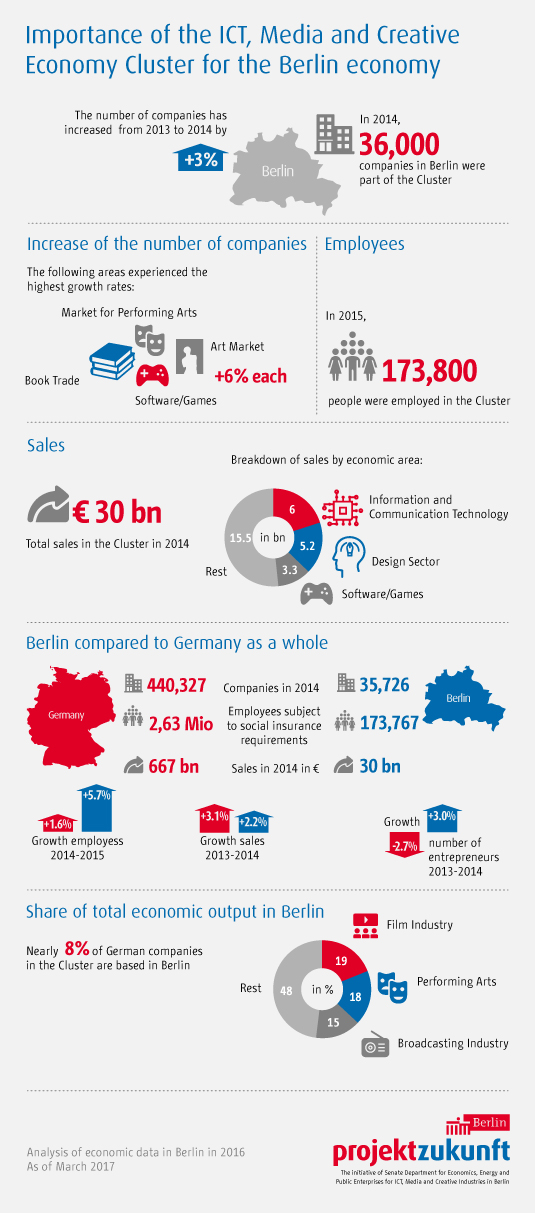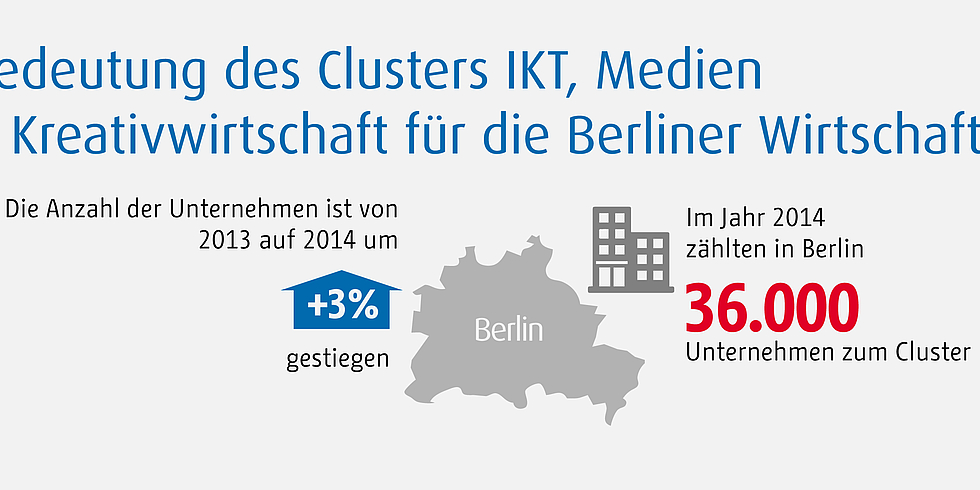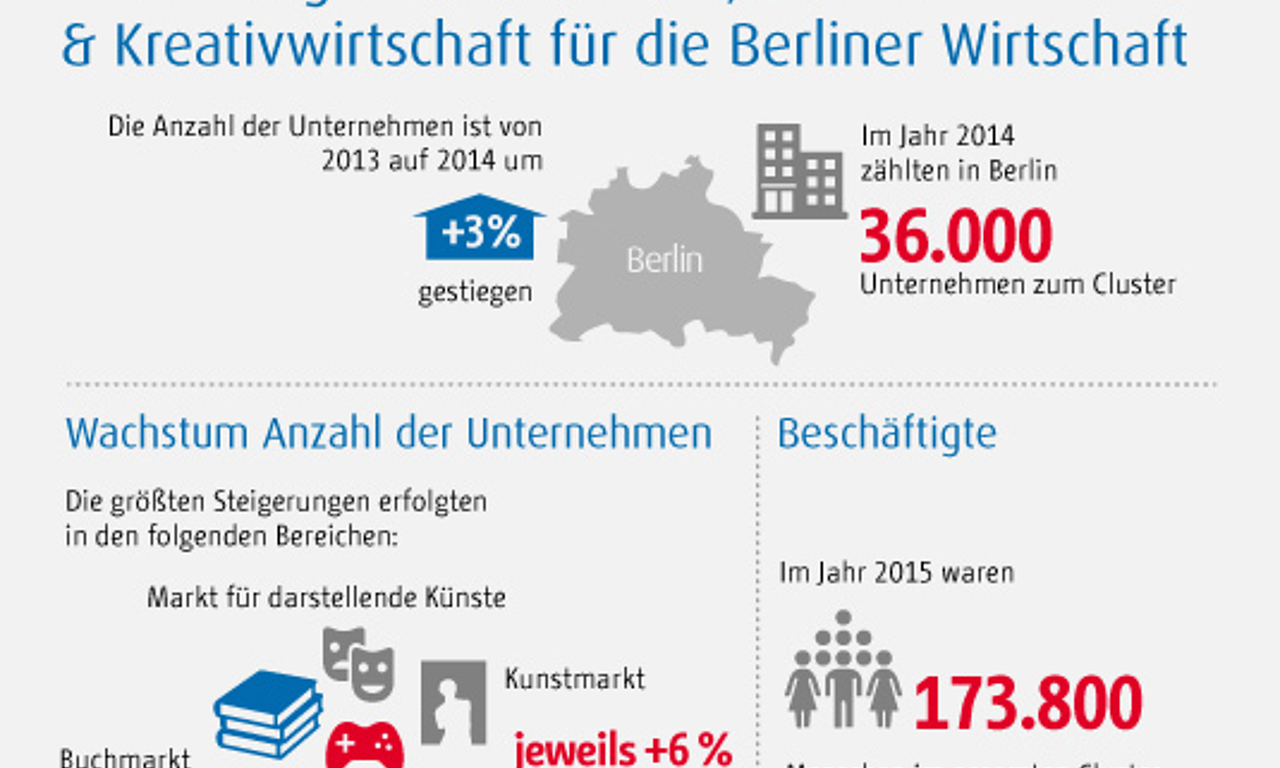Berlin manages to secure top spot in the digital and creative industries
The Cluster “Information and Communication Technology / Media and Creative Industries” is a key component of the city’s entire economy.
In 2014, 36,000 companies generated earnings totalling EUR 30 bn. 173.000 employees subject to social security requirements worked in the Cluster in 2015. And these numbers don’t include more than 100,000 freelancers. Projekt Zukunft offers an analysis of <link http://www.berlin.de/projektzukunft/fileadmin/user_upload/Wirtschaftsdaten_Final.pdf>the Cluster’s 2014/2015 economic data</link>.
In 2014, the number of companies increased by three percent and sales by two percent, compared to the previous year. Between 2014 and 2015, the number of people employed in the Cluster increased by four percent. This means that, of 170,000 Berlin-based companies subject to taxation, 21 percent operate in ICT or the media and creative industries. The companies included in the Cluster “ICT / Media and Creative Industries” account for 16 percent of overall sales.
Software/Games and ICT companies register strong sales
In 2015, with the figure totalling 57,478, most employees worked in Software/Games. In 2014, 4,603 companies operating in the industry generated sales amounting to more than EUR 3.3 bn. The remaining 2,581 ICT companies generated EUR 6 bn in sales. Significantly more companies operate in the design industry (6,985): 36,986 employees generated sales of EUR 5.2 bn. With 2,800 companies operating in the sector, the art market, too, counts among the largest industries, as measured by the number of companies. Only half as many companies operate in the marketing industry or music business (1,400 each). In terms of sales, the marketing industry managed to stand out from the crowd, boasting an increase of 54.4 percent.
Number of companies on the rise; sales are up, too.
Compared to 2013, the number of companies increased in eleven of 13 sub-markets. Registering increases of more than six percent each, the book and art trade as well as the performing arts market and software and games managed to boost sales in their respective sectors. The number of companies increased by a 1,000 across all sub-markets.
Top of the table nationwide
In total, nearly eight percent of all German companies operating in the Cluster “ICT / media and creative industries” are based in Berlin. In terms of the film industry, this number is as high as 19 percent. For the performing arts market and the broadcasting industry, the numbers come in at 18 and 15 percent, respectively. Berlin accounts for five percent of all sales generated by the Cluster in Germany. In the music industry, the performing arts market and the film industry, these figures come in at 21, 14 and twelve percent, respectively. In terms of employees subject to social security requirements, Berlin accounts for six percent of all employees in Germany. This makes the city one of the leading locations of the digital and creative industries in Germany, as this analysis shows.
Strategy proves to be successful: points of intersection between clusters
This analysis confirms the innovation strategy pursued over the last few years. <link https://www.berlin.de/sen/wirtschaft/wirtschaft/innovation-und-qualifikation/cluster/ikt-medien-und-kreativwirtschaft/artikel.104155.php>ICT / Media and Creative Industries form the largest cluster in this regard</link>. Projekt Zukunft has contributed significantly to an ever increasing number of points of intersection being created between the three industries. Berlin Fashion Week is the latest example of this accomplishment: <link http://www.berlin.de/projektzukunft/kreativwirtschaft/mode/artikel/senatorin-ramona-pop-auf-der-berlin-fashion-week/>After her tour of the trade fair, Senator Ramona Pop said</link> that Berlin “is spearheading the developments in Fashion Tech”. She continued to say that going forward, she expects a “huge innovation push”. It seems likely, therefore, that all signs will continue to point to growth in the Cluster.

Contact
Tanja Mühlhans
Leitung Kreativ- und Medienwirtschaft, Digitalwirtschaft, Projekt Zukunft



